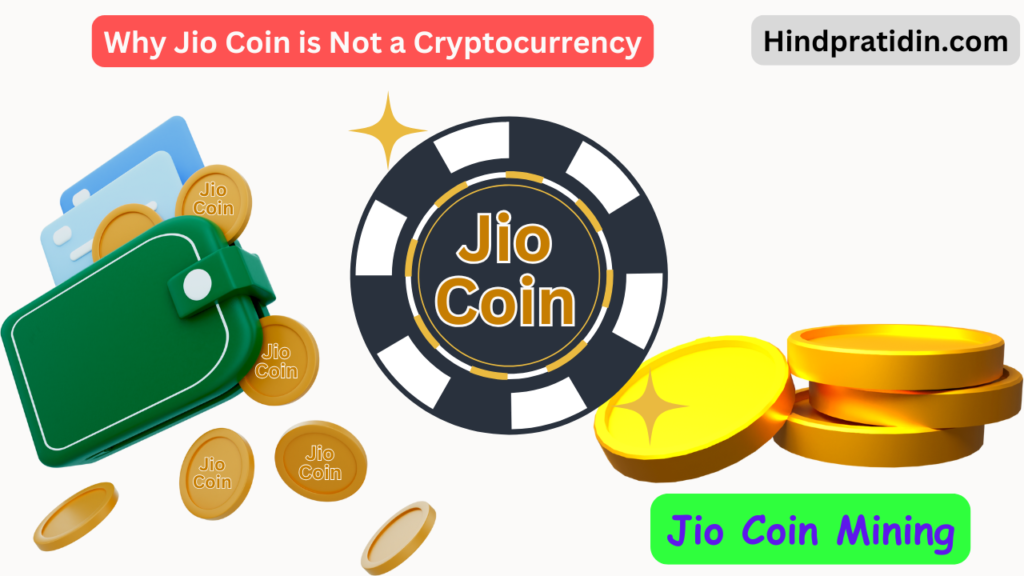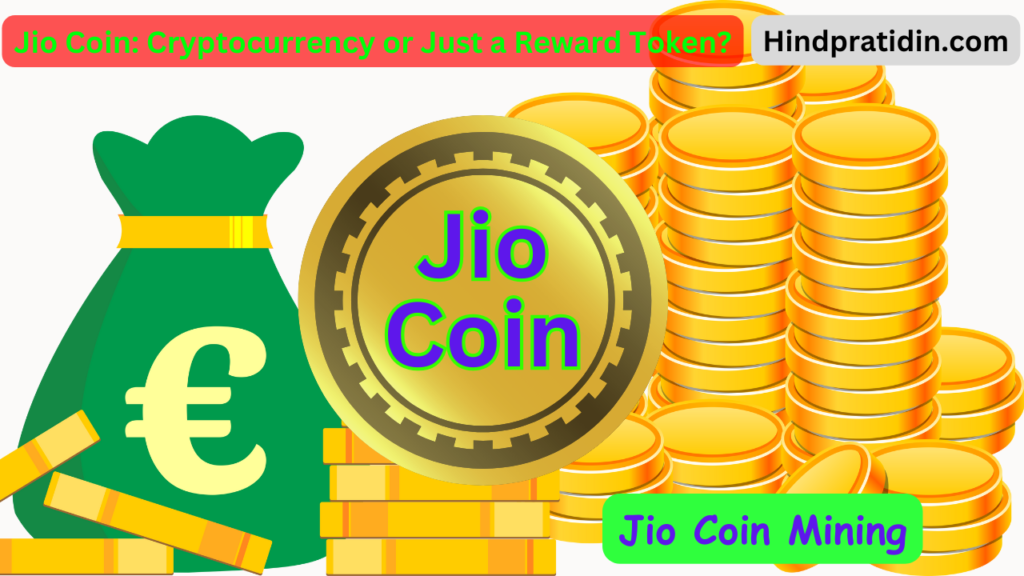Jio Coin: The announcement of Jio Coin by Reliance Jio, led by Mukesh Ambani, has created quite a stir in India’s digital and financial sectors. Ever since its introduction, there has been a flood of speculation, rumors, and excitement surrounding its potential. However, amidst all the hype, many are left wondering: Is Jio Coin really a cryptocurrency that could rival Bitcoin, or is it more of a digital reward system? Let’s dive into the details to understand what Jio Coin truly represents.
The Origin of Jio Coin
Jio Coin is reportedly a digital currency developed by Reliance Jio, the telecom giant owned by Mukesh Ambani. Its announcement has raised eyebrows and piqued curiosity across the nation. While cryptocurrencies like Bitcoin and Ethereum are known for their decentralization and blockchain-based technology, Jio Coin is believed to serve a very different purpose.
Unlike traditional cryptocurrencies, Jio Coin is expected to act as a reward token or digital loyalty point system within the Jio ecosystem. Think of it as a way to incentivize users, offer discounts, and drive engagement across Reliance Jio’s array of services, including telecom, e-commerce, and entertainment platforms. However, its exact functionality and scope are yet to be officially disclosed.
What is a Digital Currency?
Before diving deeper into Jio Coin, it’s essential to understand what digital currency means. Digital currency refers to money that exists only in electronic form. Unlike physical cash or coins, it is intangible and used for online transactions. Digital currencies can either be:
- Centralized – Controlled by an authority, such as a government or corporation.
- Decentralized – Operates on blockchain technology without a central authority, like Bitcoin.
Examples of digital currencies include:
- Cryptocurrencies: Bitcoin, Ethereum, etc., which are decentralized.
- Central Bank Digital Currencies (CBDCs): Digital versions of fiat currencies issued by central banks.
- Digital Reward Tokens: Points or credits offered by businesses for customer loyalty.
In the case of Jio Coin, it seems to align more with the digital reward token category than a decentralized cryptocurrency like Bitcoin.
| Category | Examples | Features |
|---|---|---|
| Cryptocurrencies | Bitcoin, Ethereum | Decentralized, blockchain-based |
| Central Bank Digital Currencies (CBDCs) | Digital Rupee, e-Yuan | Centralized, issued by governments |
| Digital Reward Tokens | Jio Coin, Amazon Points | Centralized, loyalty-driven |
Jio Coin and Blockchain Technology
Blockchain technology forms the backbone of most cryptocurrencies. It provides a secure, transparent, and decentralized way of recording transactions. While Jio Coin has been linked to blockchain, it is not expected to operate on a fully decentralized network like Bitcoin or Ethereum. Instead, Jio Coin’s blockchain integration seems to focus on enhancing its ecosystem by:
- Securing user transactions within the Jio ecosystem.
- Offering transparency for loyalty programs.
- Integrating blockchain-based Web3 solutions.
Jio Coin’s Collaboration with Polygon
One of the most significant developments in Jio Coin’s journey is its partnership with Polygon Labs, a Bengaluru-based blockchain infrastructure company. Polygon is known for its scalable and efficient blockchain solutions.
Through this partnership, Reliance Jio aims to:
- Bring innovative Web3 features to its services.
- Utilize Polygon’s blockchain technology to enhance its digital offerings.
- Cater to its 450 million+ customer base with seamless blockchain-based solutions.
This collaboration highlights Jio’s focus on leveraging blockchain for practical applications within its ecosystem, rather than creating a standalone, decentralized cryptocurrency.
Why Jio Coin is Not a Cryptocurrency Like Bitcoin

It’s crucial to distinguish Jio Coin from established cryptocurrencies like Bitcoin. Here are the key differences:
| Feature | Jio Coin | Bitcoin |
| Purpose | Reward token for users | Decentralized digital currency |
| Decentralization | Centralized | Fully decentralized |
| Blockchain Integration | Limited to Jio ecosystem | Open and global blockchain |
| Regulatory Challenges | Likely minimal in scope | Faces significant regulation |
| Financial Freedom | Rewards-based incentives | Investment asset |
Customer Engagement Tool
Jio Coin’s primary goal is to act as a customer engagement tool. Users may earn Jio Coins by engaging with Jio’s services, such as:
- Purchasing products on Jio platforms.
- Streaming movies on JioCinema.
- Shopping online using JioMart.
The earned coins can then be redeemed for discounts or exclusive offers, making it more of a loyalty reward system.
The Regulatory Landscape in India
India has been cautious about digital currencies, especially cryptocurrencies. While the government has not outright banned them, it has imposed strict regulations to curb their misuse. Jio Coin’s structure as a centralized reward token helps it avoid many of the regulatory hurdles that cryptocurrencies like Bitcoin face. However, questions remain about its classification:
- Will Jio Coin be taxed as a digital asset?
- Can users trade or transfer Jio Coins outside the ecosystem?
Until more details emerge, these questions remain unanswered.
Advantages of Jio Coin
- Customer Retention: By rewarding users, Jio Coin encourages customer loyalty.
- Seamless Integration: It integrates into Jio’s vast ecosystem of services.
- Blockchain Security: Offers secure transactions using blockchain technology.
- Scalable Infrastructure: Polygon’s blockchain ensures efficient operations.
Challenges Facing Jio Coin
- Regulatory Scrutiny: Despite its limited scope, Jio Coin must comply with India’s digital asset regulations.
- Limited Use Case: If confined to the Jio ecosystem, its appeal may diminish.
- Competition: Other digital reward systems may offer similar benefits.
Comparison: Jio Coin vs Bitcoin
| Feature | Jio Coin | Bitcoin |
| Network | Centralized (Jio Ecosystem) | Decentralized (Global) |
| Usage | Rewards and discounts | Investment, payments |
| Creation | Managed by Jio | Mining-based |
| Regulation | Compliant with Indian laws | Faces global regulation |
| Technology | Blockchain (Polygon-based) | Blockchain (Decentralized) |
FAQs About Jio Coin
1. Is Jio Coin a cryptocurrency?
No, Jio Coin is more of a reward token or digital loyalty point system and not a decentralized cryptocurrency like Bitcoin.
2. Can I invest in Jio Coin?
As of now, Jio Coin is not intended for investment purposes. It is designed to reward customers within the Jio ecosystem.
3. How can I earn Jio Coins?
Users may earn Jio Coins by purchasing products, streaming content, or engaging with Jio’s services. Exact details are yet to be announced.
4. Is Jio Coin based on blockchain?
Yes, Jio Coin is expected to utilize blockchain technology, specifically through its partnership with Polygon.
5. Will Jio Coin be regulated?
Jio Coin’s structure as a centralized reward token makes it less prone to stringent cryptocurrency regulations in India.
Also Read: Reliance Jio Coin: How to Earn It for Free with Simple Steps
Conclusion
Jio Coin, while exciting, is not a traditional cryptocurrency like Bitcoin or Ethereum. Instead, it is positioned as a digital reward system aimed at enhancing customer engagement within Reliance Jio’s ecosystem. Its blockchain integration and partnership with Polygon showcase its potential to innovate in the Web3 space. However, its success will depend on how Reliance Jio implements and expands its use cases. For now, Jio Coin remains an intriguing addition to India’s digital landscape, but it is far from being a decentralized, investment-worthy cryptocurrency.



Pingback: Now You Can Buy Jio Coin Very Easily! Dreaming Of Big Earnings? Here’s Everything You Need to Know – jiocoinmining.com
Pingback: Dr. Agarwal’s Healthcare IPO: A Guide to Date, Price, GMP Trends, and More – hindpratidin.com